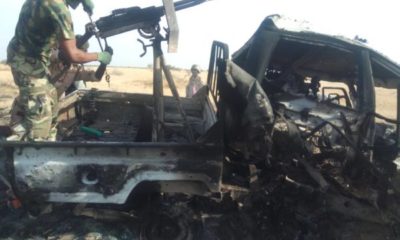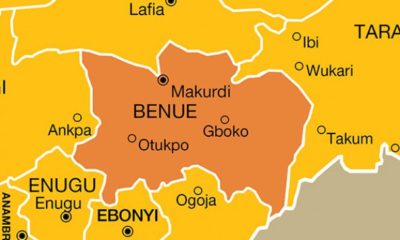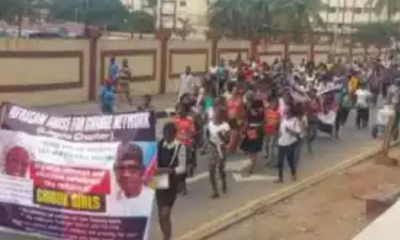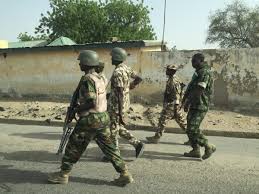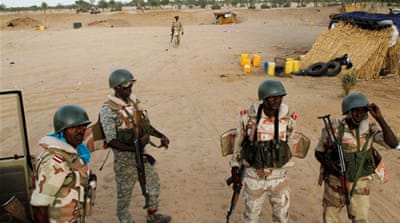Nigeria News
Boko Haram: Military offensive and ring of uncertainties
The dusty, remote spot in Nigeria’s far northeast where the military says insurgents operated a major camp is now little more than burnt-out cars, strewn trash and unanswered questions.
More than three weeks into a military offensive seeking to end a years-long insurgency by Islamist extremist group Boko Haram, Nigeria has claimed important successes, but the truth is difficult to determine.
It has denied killing civilians, though it declines to provide numbers or details on casualties.
Soldiers say Boko Haram members have “scattered” in areas where the army has pushed them out, but they cannot say where, only that “hundreds” have been arrested.
Thousands of residents have fled into neighbouring Niger and Cameroon, and some allege soldiers indiscriminately killed civilians in raids before the offensive officially began. The military denies this.
Mobile phone lines have been cut in much of the region since the start of the offensive on May 15 and visiting remote areas independently is difficult if not impossible.

2 soldiers at Boko Haram front
Journalists recently visited the deserted Boko Haram “camp” soldiers say they chased insurgents away from near the village of Kirenowa as part of a tightly orchestrated military tour.
The tour wound into a patch of the semi-desert northeast, where acacia trees and shrubs dot the dry, flat landscape along with occasional villages of brick houses with thatch roofs.
Military officials have at times provided conflicting details of operations, including involving the camp near Kirenowa, raising further questions over which version if any is correct.
In 2009, Nigeria launched a brutal offensive against Boko Haram that killed some 800 people and forced the group underground for more than a year — but they returned with even deadlier attacks.
This time the security operation “involved not just the military but the security agencies of the country,” Brigadier General Chris Olukolade, a defence spokesman, told reporters on Thursday.

Brigadier Olukolade
“The network this time is perfect, I mean near perfect, in the sense that the operation was planned to ensure their bases were dislocated — not just dislocated but completely wiped out.”
Some say the offensive may have obliterated the possibility of legitimate dialogue, while others have expressed doubts that a military operation could lead to lasting peace.
“The entire Chinese army cannot solve this problem,” said Bulama Mali Gubio, spokesman for an influential elders’ forum in Nigeria’s Borno state, Boko Haram’s original home base.
Boko Haram’s insurgency has been under way since 2009, but a series of particularly violent events preceded President Goodluck Jonathan’s state of emergency declaration on May 14 in the volatile northeast of Africa’s most populous nation.
In April, the military faced accusations of major abuses after nearly 200 people were left dead in the town of Baga, with residents alleging soldiers shot civilians and set fire to much of the community.
The Red Cross put the death toll at 187, but the military insisted that only 37 people died in the fighting, while saying insurgents caused the blazes.
A May 7 attack in Bama saw insurgents disguised in military uniforms break into a prison and attack several government buildings, leaving 55 people dead. Nigerian authorities later said they freed three women and six children abducted by Boko Haram during the attack.
However, there were also accusations of military abuses in Bama. Ali Elhadji, a 56-year-old who fled back to his parents’ home village in Cameroon, Gance, said Boko Haram had spread violence in Bama and soldiers brutally retaliated.
He said soldiers arrived several weeks before the May 15 start of the offensive and killed indiscriminately.
“They killed all those who appeared young and who they crossed in the streets,” he told AFP recently in Gance. “They killed many innocents.”
There is no question that the insurgency mainly in Nigeria’s deeply impoverished north has been brutal.
Boko Haram is blamed for hundreds of deaths through suicide attacks, targeted killings, car bombings and other means.
In declaring the state of emergency, the president said the group had taken over pockets of territory in the remote northeast.
Soldiers said the extremists even raised their own flags in the Marte area.
At the same time, the military’s response to the insurgency over the last several years has come under heavy criticism, with widespread accusations of extra-judicial killings, arbitrary arrests and unlawful detentions.
Diplomats and analysts have long said a military solution alone is unlikely to resolve the problem, stressing that conditions in the severely underdeveloped north must be addressed.
The government in Africa’s largest oil producer has more recently sought to portray itself as offering a carrot-and-stick approach, carrying out the offensive but also forming a panel to look at possibilities for offering an amnesty to insurgents.
It recently released 58 women and children who had been held in connection with the insurgency. Boko Haram leader Abubakar Shekau had demanded that the government release the wives and children of its members.
But with the offensive grinding on and its details unclear, it is difficult to know what effect if any such moves have had.
“Is it dialogue with the people you are pursuing with troops, with armoured tanks and with fighter jets?” Gubio said. “Are these the people you are trying to give amnesty to?”
——————————————————————————————————————————————-
Posted in Nigeria News. A DisNaija.Com network.
Source: PM News
DisNaija.Com publishes regular posts on Nigeria News, Nigerian Newspapers, Online Nigeria Gist.
Follow us on Twitter and Facebook.
Nigeria News
Follow @Dis_Naija
Your Opinion Counts. Be sure To Leave A Comment, If You Have Any.
Please Like, Share or Tweet. Your Support Is Appreciated.

Nigeria News
Kano Transfers Over 1,000 Almajiris To Different States Amidst COVID-19 Pandemic

The Kano State Government on Saturday said it has transferred 1,098 ‘almajiris’ to different states of the country.
The commissioner for local government, Murtala Garo, disclosed this while presenting a report before the state’s task force on COVID-19 at the government house, Kano.
Almajiris are children who are supposed to be learning Islamic studies while living with their Islamic teachers. Majority of them, however, end up begging on the streets of Northern Nigeria. They constitute a large number of Nigeria’s over 10 million out-of-school children.
Mr Garo said the Kano government transported 419 almajiris to Katsina, 524 to Jigawa and 155 to Kaduna. He said all of them tested negative for coronavirus before leaving the Kano State.
Despite the coronavirus test done in Kano for the almajiris, the Jigawa government earlier said it would quarantine for two weeks all the almajiris that recently arrived from Kano.
Mr Garo said another 100 almajiris scheduled to be taken to Bauchi State also tested negative to COVID-19.
In a remark, Governor Abdullahi Ganduje said the COVID-19 situation in Kano was getting worse. He appealed for a collaborative effort to curtail the spread of the virus in the state.
Mr Ganduje, who commended residents for complying with the lockdown imposed in the state, said the decision was taken to halt the spread of the virus.
Kano State, as of Saturday night, has 77 coronavirus cases, according to the Nigeria Centre for Disease Control.
The decision to transfer the Kano almajiris is part of the agreement reached between Northern governors that almajiris in each state be transferred to their states of origin.
However, even before the latest agreement by the governors, the Kano government had been transferring almajiris to other states and neighbouring countries after it banned street begging in the state, most populous in Northern Nigeria.
Despite the transfers, however, no concrete step has been taken to ensure such children do not return to Kano streets as there is freedom of movement across Nigeria although interstate travel was recently banned to check the spread of the coronavirus.
Sourced From: Premium Times Nigeria
Nigeria News
COVID-19: ‘Bakassi Boys’ Foil Attempt To Smuggle 24 Women Into Abia In Container

By Ugochukwu Alaribe
Operatives of the Abia State Vigilante Service, AVS, popularly known as ‘Bakassi Boys’ have arrested 24 market women hidden in a container truck, at Ekwereazu Ngwa, the boundary community between Abia and Akwa Ibom states.
The market women, said to be from Akwa Ibom State, were on their way to Aba, when they were arrested with the truck driver and two of his conductors for violating the lockdown order by the state government.
Driver of the truck, Moses Asuquo, claimed he was going to Aba to purchase stock fish, but decided to assist the market women, because they were stranded.
A vigilante source told Sunday Vanguard that the vehicle was impounded while the market women were sent back to Akwa Ibom State.
Commissioner for Home Land Security, Prince Dan Okoli, who confirmed the incident, said that smuggling of people into the state poses great threat to the state government’s efforts to contain the spread of COVID- 19.
Sourced From: Vanguard News
Nigeria News
Woman Kills Her Maid Over Salary Request

Operatives of the State Criminal Investigation and Intelligence Department (SCIID), Yaba of the Lagos State police command have arrested one Mrs Nene Steve for allegedly killing her maid, Joy Adole
The maid was allegedly beaten to death by Nene for requesting for her salary at their residence located at 18, Ogundola Street, Bariga area in Lagos.
Narrating the incident, Philips Ejeh, an elder brother to the deceased said that he was sad when they informed him that his sister was beaten to death.
He explained that the deceased was an indigene of Benue State brought to Lagos through an agent and started working with her as a maid in January 2020.
‘’She reported that her boss refused to pay her and anytime she asked for her salary she will start beating her.
She was making an attempt to leave the place but due to the total lockdown she remained there until Sunday when her boss said she caught her stealing noodles and this led to her serious beating and death,’’ Ejeh said.
He called on Lagos State Government and well- meaning people in the country to help them in getting justice for the victim.
The police spokesman, Bala Elkana, stated that the woman and her husband came to Bariga Police Station to a report that their house girl had committed suicide.
Detectives were said to have visited the house and suspected foul play with the position of the rope and bruises all over the body which confirmed that the girl had been tortured to death and the boss decided to hang up the girl to make it look like suicide.
He said: “The police moved on with their investigation and found a lot of sign of violence on her body that she has been tortured before a rope was put on her neck.’’
He added that the police removed the corpse and deposited it in the mortuary for autopsy to further ascertain the cause of the death.
Elkana said the matter has been transferred from Bariga police station to Panti for further investigation while the couple have been arrested and will be charged to court.
Tribune
Boko Haram Attacks: Buhari Summons Urgent Meeting Of Service Chiefs

Ostensibly alarmed by the latest killings of dozens of soldiers by Boko Haram insurgents, President Muhammadu Buhari has summoned an urgent meeting of Service Chiefs to find ways to stop the trend.
He has also dispatched the Minister of Defence, Mansur Dan Ali, to the neighbouring Republic of Chad for an urgent meeting with President Idris Deby and his defence counterpart.
Knowledgeable sources said in Abuja on Friday that the president is worried by on the deterioration of security situation on the Nigeria – Chad Border that has led to the recently increased Boko Haram terrorism in the area.
The sources which did not want to be named in Abuja said: “Nigeria has a Chad problem in the Multi-National Joint Task Force (MNJTF) put together to secure the Lake Chad basin areas and repeal the Boko Haram terrorist attacks against all the countries neighbouring the Lake.”
The sources noted that Chad is believed to be having their own internal security challenges and this has reportedly led to their pulling away their own troops manning their own border around Lake Chad, saying: “That lacuna is being exploited by the Boko Haram terrorists, who go in and out of Nigeria, Niger and Cameroon to launch terrorist acts. This is a clear illustration of the fact that terrorism is beyond national borders.”
When contacted, the Senior Special Assistant to the President on Media and Publicity, Garba Shehu, confirmed that the Defence Minister is going to Chad but said he is unaware of the purpose.
Meanwhile, the military authorities are said to be in the process of identifying the families of the latest victims with a view to making contact with them.
Credible sources revealed that it is the reason the president is yet to make any pronouncement on the matter.
“The President has called an urgent meeting with the Service Chiefs, as well as the fact that families of the latest victims of the Boko Haram are being identified and contacts made before a government pronouncement on the tragic attacks. This, it is understood, is the reason for the silence of the government over the incident,” the source said.
Sourced From: Tribune

